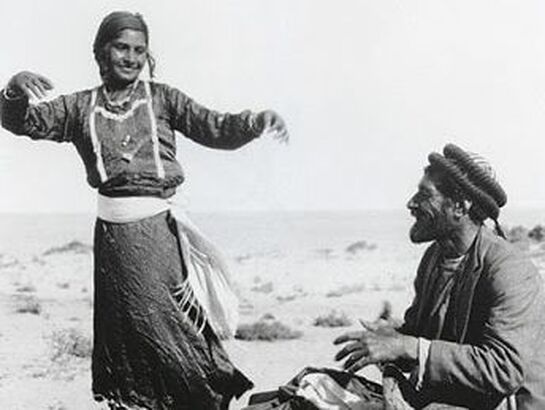|
|
|
The Domari Gypsy community of Jerusalem is relatively small; estimates suggest it comprises around 111 families. The numbers are larger in Gaza and the West bank, where it is estimated there are 15,000. Many Palestinians and Israelis are not aware that this community lives at the heart of city.
In the Arab world, and East Jerusalem included, Domari people are referred to as 'Nawar', a term which is said to be derived from fire. The Tribal Leader of the Domari in Jerusalem says that the word 'Nawar' (related to Noor or ‘light’ in Arabic) was given to them because they came to Jerusalem with the Muslim fighter Noor Al Din Zenki who fought alongside Salah Al-Din in 1187. Another suggested reason for the name is that many of the Domari worked as blacksmiths who used fire. However, stigma and discrimination against the community has led the name 'Nawar' to be filled with negative connotations; the word has evolved to describe unruly behaviour, as an insult, and is very much in use in conversation today. I started researching the Domari community in Jerusalem in 2017. Getting members of the community to engage in this research was not easy. Palestinians residing in occupied East Jerusalem, including the Domari community, are in constant fear and suspicion of people asking questions about their lives, due to the fact that they do not have settled citizenship status in Israel and they only have residency permits. Following the occupation of East Jerusalem, Israel granted the Palestinian community and the Domari community living there residency status. With no citizenship status in any other country, their fragile legal status makes them reluctant to share information about their lives, as they fear they risk losing their residency rights.
I managed to reach fifteen Domari women residing in Jerusalem and conducted in-depth interviews with them. Their narratives were analysed through an intersectional lens to expose the multiple oppressions to which they are subject. Their stories reveal high levels of stigma and isolation, which have disempowered members of the community and perpetuated the cycle of their exclusion. Exploring the social prospects and standing of Domari women in East Jerusalem, one needs to understand the power relations and the political and socio-economic hierarchies in the city. In the context of Jerusalem, the hegemonic forces of colonialism, capitalism and patriarchy shape the experiences of people residing in the city.
In my Identities article, 'The social exclusion of the Domari society of Gypsies in Jerusalem: a story narrated by the women of the tribe', I draw on these interviews and offer a description of the institutional discrimination Domari women face in Jerusalem from several aspects: their interaction with governmental institutions, their experiences in the labour market, the social services they receive, and their interaction with their surrounding community and neighbours. My article looks into the women's distinctive unequal and stigmatised social experiences in the city and the intersecting systems of power that create and reproduce their loss of status, and hence their exclusion. These women's narrated stories reflect a feeling of isolation from both the Palestinian and Israeli communities. The women interviewed resided in the most disadvantaged neighbourhoods in the city. Living under Israeli rule, the socially constructed value of their language, ethnicity and religion is less than that of Jewish Israeli citizens. Their residency status and lack of citizenship disempowers them further, curtailing their life opportunities. Their stigmatised identities as women from an ethnic minority result in several systems of oppression, operating against them simultaneously, denying them access to resources, equal social rights, work opportunities, wealth and power.
Blog post by Rawan Asali Nuseibeh, Hebrew University, Jerusalem
Read the full article: Nuseibeh, Rawan Asali. The social exclusion of the Domari society of Gypsies in Jerusalem: a story narrated by the women of the tribe. Identities: Global Studies in Culture and Power. DOI: 10.1080/1070289X.2020.1738130
0 Comments
Your comment will be posted after it is approved.
Leave a Reply. |
|
Explore Identities at tandfonline.com/GIDE |
|
The views and opinions expressed on The Identities Blog are solely those of the original blog post authors, and not of the journal, Taylor & Francis Group or the University of Glasgow.

